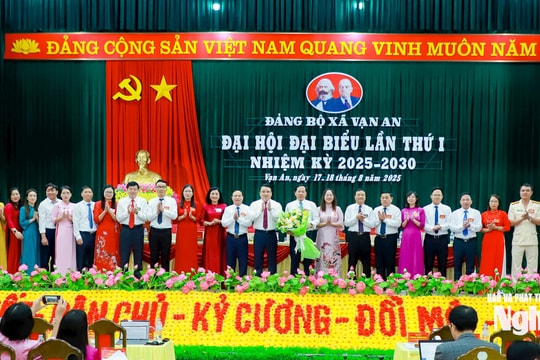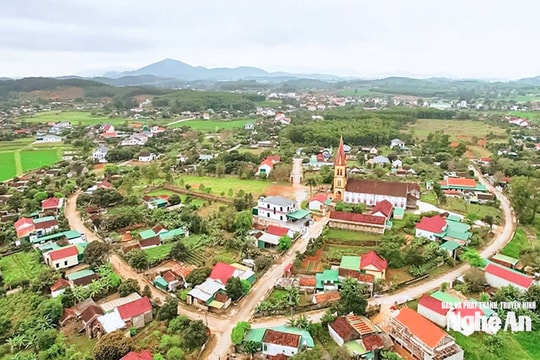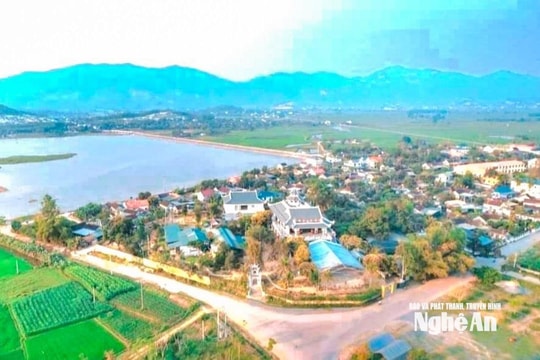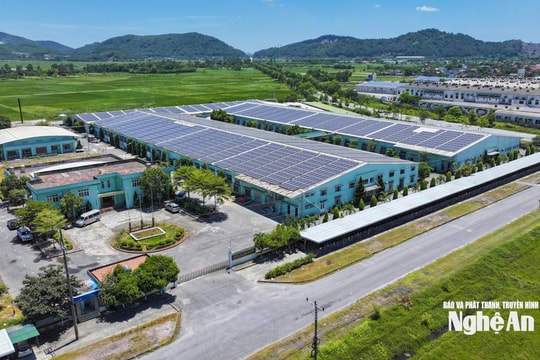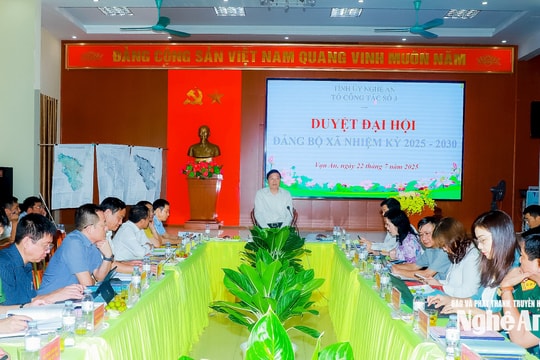The house of Mr. Pho Bang in Sen village - Where the personality of President Ho Chi Minh's family shines
(Baonghean.vn) - "Here is Uncle Ho's hometown, Sen Village/ The old road Uncle Ho once walked/ The hibiscus trees are still green/ Thatched roofs with humble bamboo curtains".
The place to preserve and shine the personality of President Ho Chi Minh's family
Before the eyes of visitors is a small house, thatched roof, looming under the green bamboo hedge. "The Vice-Chancellor's House" - a place bearing many traces of the youth ofPresident Ho Chi Minh. The house has entered the hearts of the Vietnamese people and international friends with many sacred emotions. Who would have thought that a national leader, a world cultural celebrity lived a simple life, growing up in such a rustic, humble house. This place has completely preserved and shone the personality of President Ho Chi Minh's family, reflecting the Vietnamese soul and character.
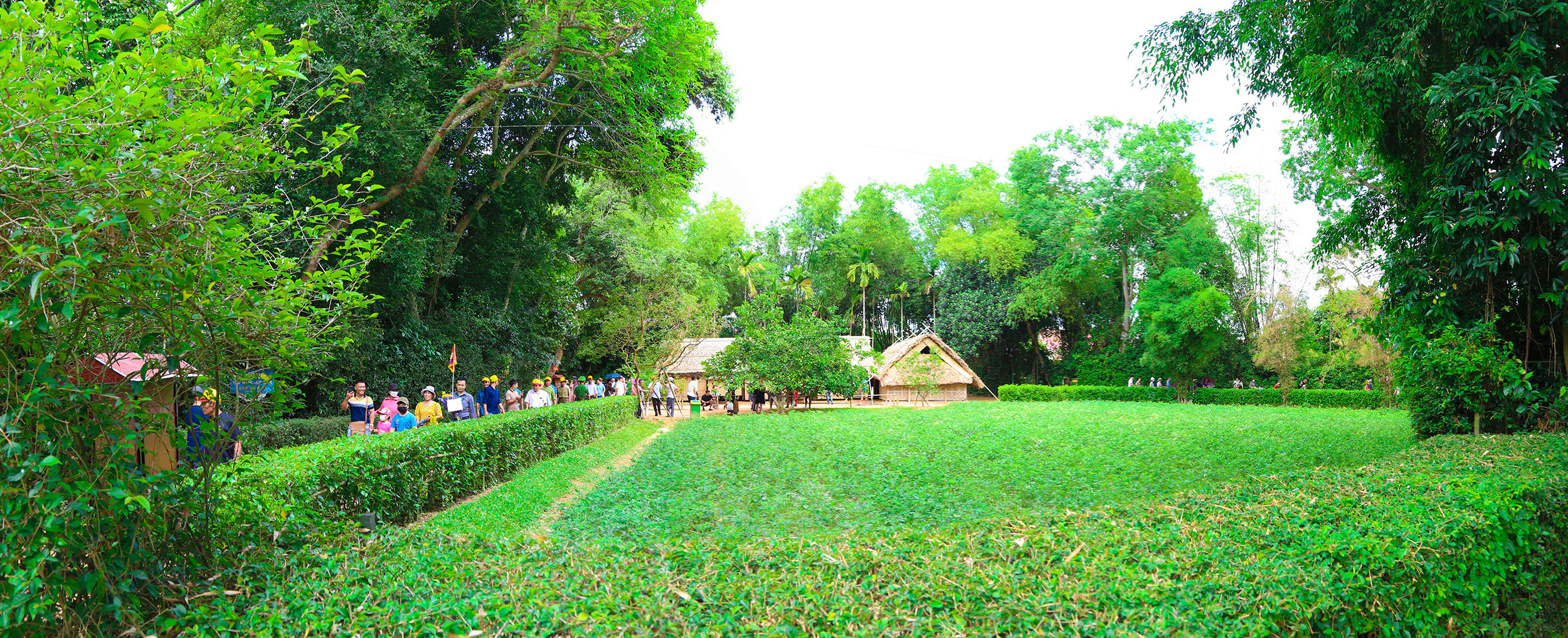 |
| People visiting Uncle Ho's hometown in May. Photo courtesy of Dinh Tuyen |
The low, small houses are typical of houses in the Vietnamese countryside. Coming here, visitors can feel more fully the Vietnamese countryside, the countryside of Nghe An. Writer Nicholas (Romania) commented: "The simple thatched house in the small village is the homeland, the soul of the entire Vietnamese people". All the relics revive the life of our ancestors' rural people in the past.
An English historian interestingly recorded: “Coming to Kim Lien, I found it even more strange. I have never seen a museum where I could hear the sound of roosters crowing and birds singing.” The unforgettable impression, the deep and magical attraction when visitors come here are not the massive architectural works, the bustling entertainment area, but the thatched roofs, bamboo paintings, the simple, humble, time-stained memorabilia and artifacts that were associated with President Ho Chi Minh’s childhood. That thatched house has shone the personality of Mr. Pho Bang Nguyen Sinh Sac, has nurtured and cultivated the soul of President Ho Chi Minh.
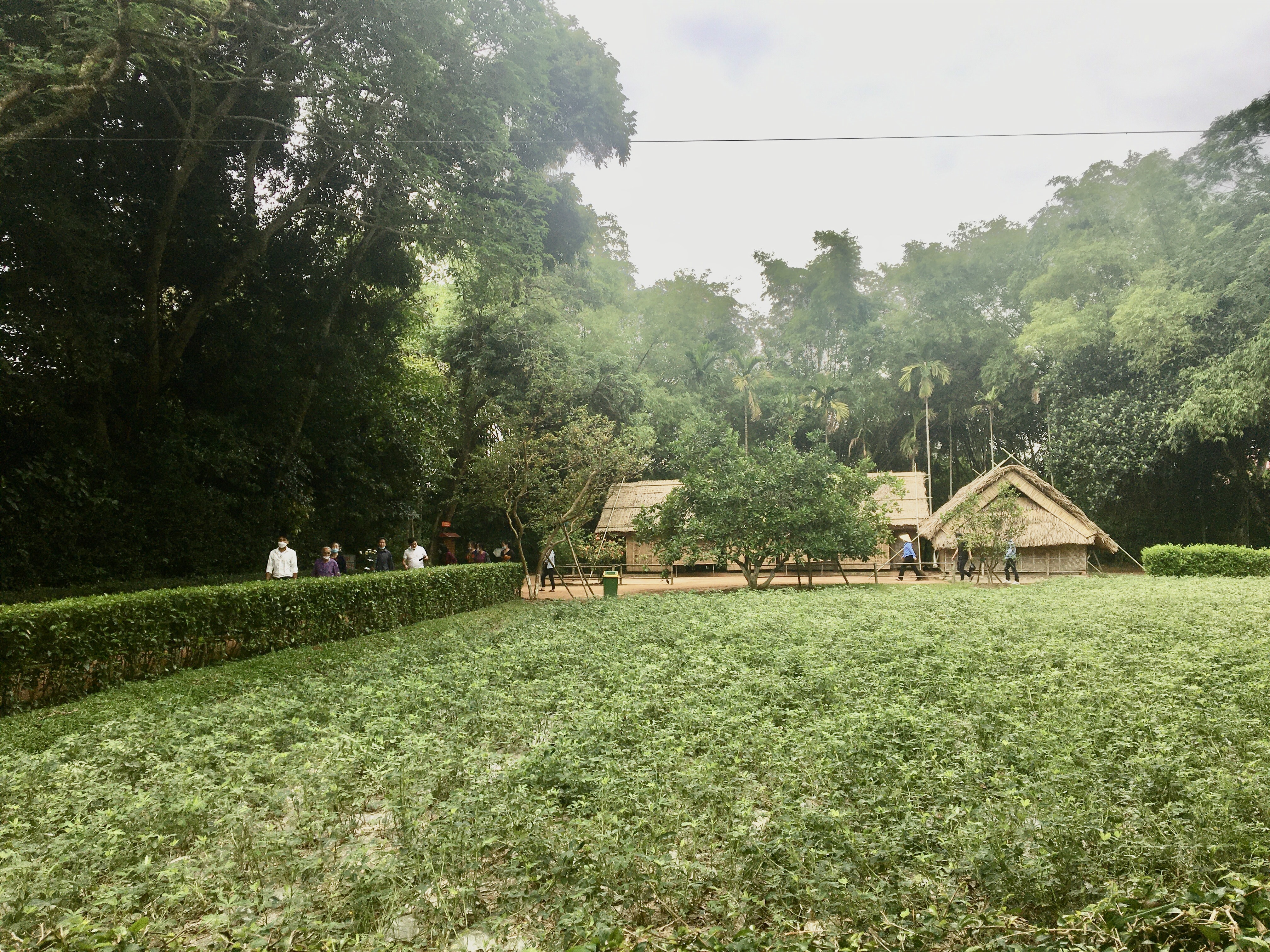 |
| Panoramic view of Sen Village relic - Uncle Ho's paternal hometown. Photo by Le Ha |
Although he passed the Vice-Chancellor's exam, Uncle Ho's father, Nguyen Sinh Sac, did not pursue a career as an official and lived a frugal life. The furniture in the house was very simple and plain. The wooden bench in the first room was for receiving guests. At that time, Nguyen Sinh Cung was often allowed by his father to stand next to him to get water and medicine. It was here that he listened to the stories of Confucian scholars and mandarins discussing current events and better understood the social situation in Vietnam at that time. The literary and political discussions of the scholars of the time had a profound influence on the formation of his personality, patriotic thoughts, will to liberate the nation and his path to save the country.
The second room is the altar of President Ho Chi Minh's family members, also made of bamboo, without lacquer or gold leaf. When he returned to his hometown, Uncle Ho emotionally said: "In the past, my family was poor, the altar was also made of bamboo, without legs, but only two pieces of wood nailed to the two sides of the pillars to support the altar, the frame was made of bamboo, and a mat was spread on top."
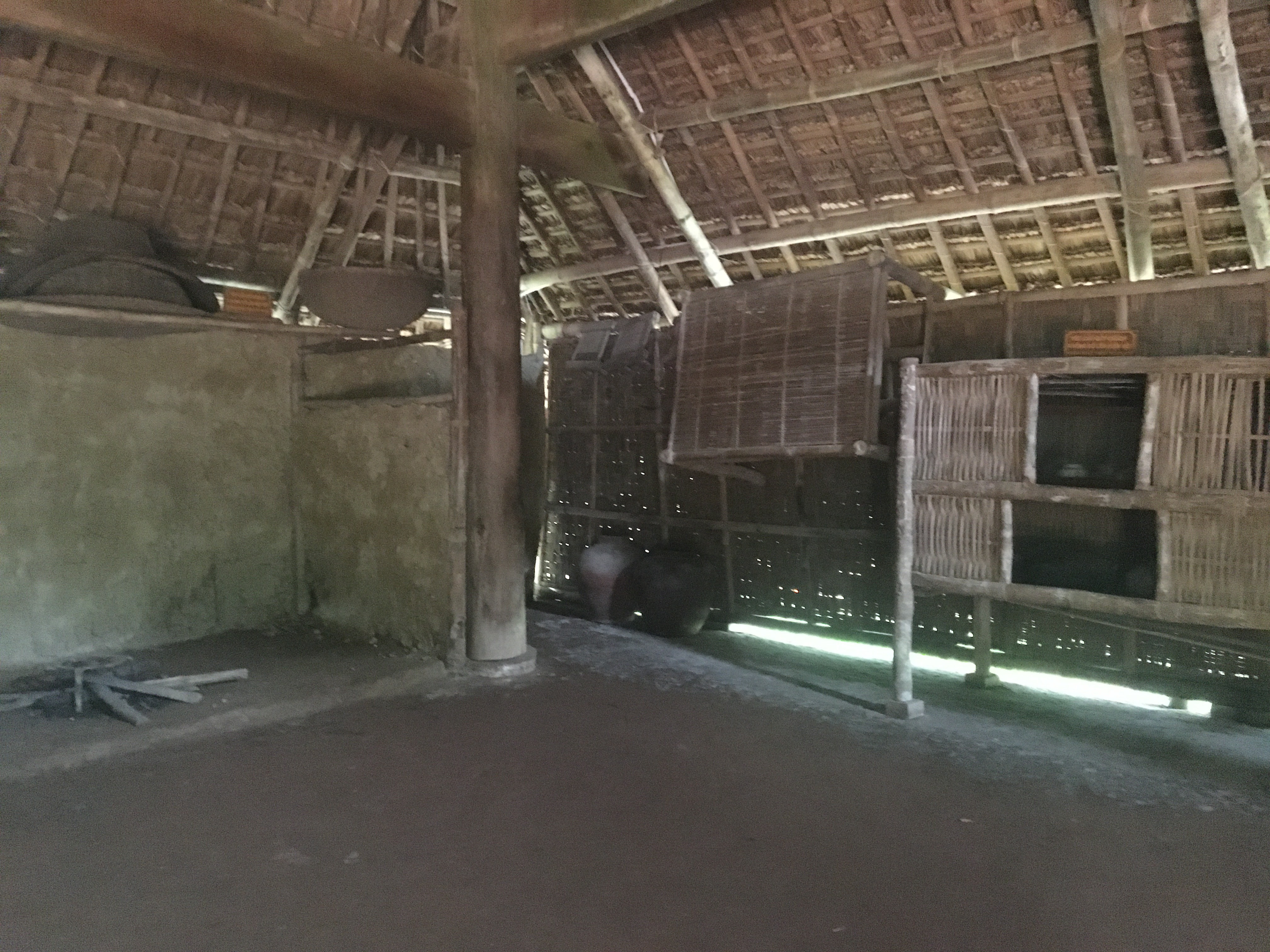 |
| Uncle Ho's family kitchen at Sen Village Relic. Photo by Le Ha |
The resting place of Nguyen Thi Thanh, Uncle Ho's older sister, was a small wooden bed with bamboo blinds. The remaining two rooms were the resting place of Nguyen Sinh Sac and his two sons. There was not much furniture. A chest to store rice, a cupboard where relatives celebrated their father's passing. A bamboo cupboard under the kitchen with only a few simple pots and pans. A wooden tray for receiving guests, a bamboo tray for daily meals. That was all the "assets" of the family of Mr. Pho Bang Nguyen Sinh Sac, which followed Uncle Ho through his childhood.
The house of Mr. Pho Bang Nguyen Sinh Sac in Sen village - Kim Lien as well as Uncle Ho's stilt house in the Presidential Palace are very simple and modest. The family only uses what is really necessary. Because the Mr. Pho Bang and his children all understand that our country is still poor, our people are still suffering. Uncle Ho's relatives always put their lives in the lives of the people.
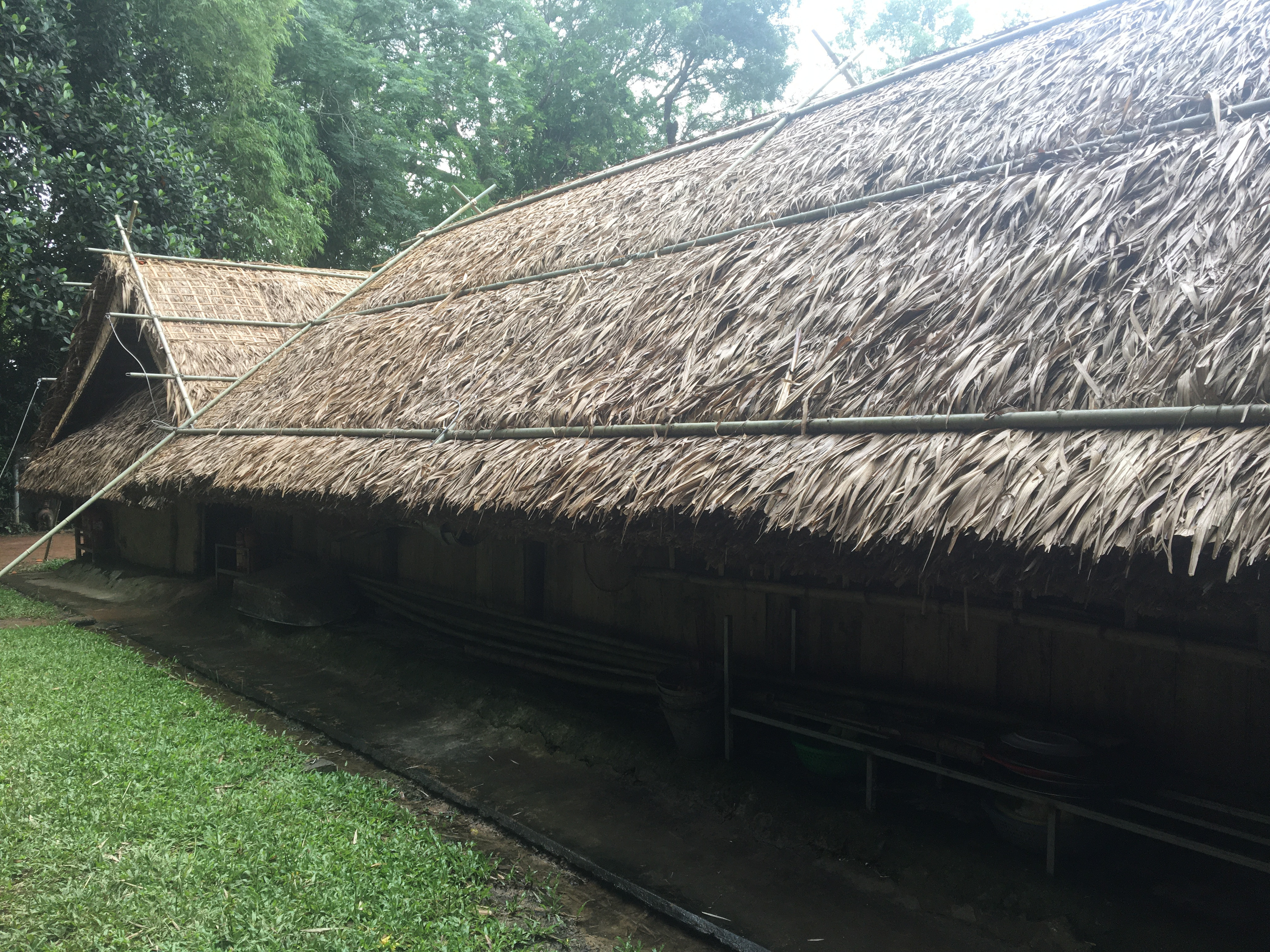 |
| Simple, rustic thatched roof at Sen Village Relic. Photo by Le Ha |
As a Swedish journalist commented: "The members of President Ho Chi Minh's family all live not only for themselves but also for society." It can be said that the house is like a mirror for us to see the simple lifestyle, close to the people, reflecting the soul and character of the members of the poor Confucian family with a love for the country and the people. The house of Mr. Pho Bang, one of the high achievers at that time, was just that simple. Mr. Nguyen Sinh Sac did not accept a grand reception when he returned to Pho Bang, showing his noble heart, not wanting to make the people work hard for him. He divided the reward fields among the poor.
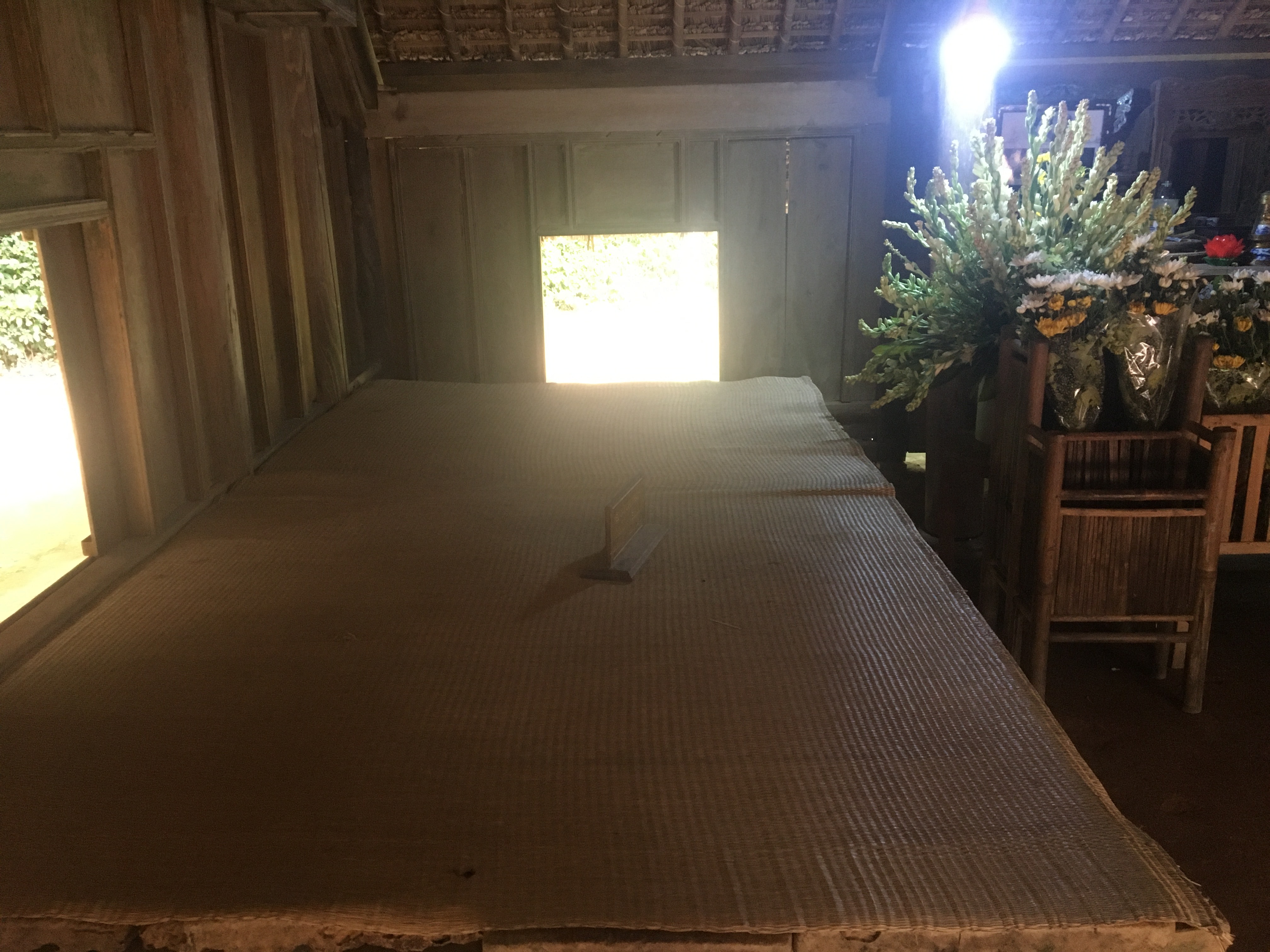 |
| The Ministry of Propaganda of Mr. Nguyen Sinh Sac - President Ho Chi Minh's father receiving guests. Photo by Le Ha |
He often taught his children: “Do not use the style of a mandarin’s family as your own style.” He and his children lived a simple life, in harmony with the working people, sharing the sweet and the bitter, and having fun together over a pot of green tea and a pot of boiled potatoes. His sister Nguyen Thi Thanh and brother Nguyen Sinh Khiem, his siblings, had to go through a life of imprisonment for the sake of national independence and the happiness of the people.
The members of Uncle Ho’s family are all people with great humanity. That humanity is inherited and promoted by the humanitarian tradition of the Vietnamese people “love others as you love yourself” and is the red thread running through all the lives of President Ho Chi Minh’s family members. Standing in front of the small, simple house, everyone feels deeply moved.
Sen Village has become a "Common Homeland"
On the occasion of visiting Uncle Ho's hometown, Major General Nguyen Van Huong - General Director of the General Department of People's Security was moved and moved by the very simple souvenirs that Uncle Ho and his family left behind: "The souvenirs from Uncle Ho's lifetime have reminded us of our infinite love because from there was born a son, a great leader of the nation and from there we have today. We vow to strive to carry out Uncle Ho's words before he passed away."
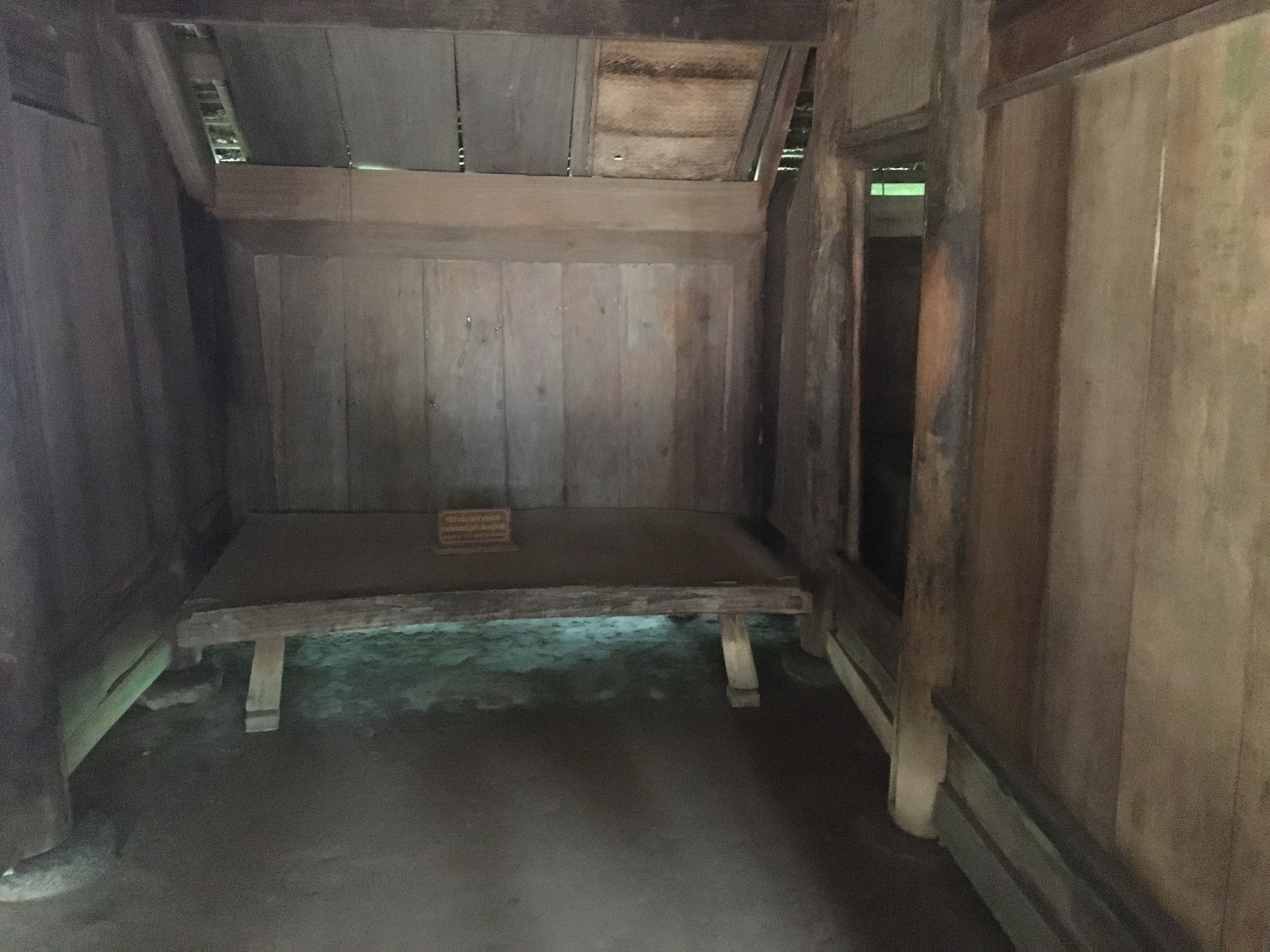 |
| The bed where Ms. Nguyen Thi Thanh, Uncle Ho's sister, rested. Photo by Le Ha |
While confiding and wiping away tears, Ms. Nguyen Thi Thuy (Tien Giang) shared: “Coming to Uncle Ho’s house, I feel as familiar as coming home. Uncle Ho’s house is so simple and ordinary. Coming here, I respect Uncle Ho even more. I will tell my children and grandchildren so that they can better understand the history of the nation, the simplicity and great contributions of Uncle Ho to the country.” Ms. Thuy’s feelings are also the common feelings of all Vietnamese people towards beloved Uncle Ho. It was in this historic house, after more than half a century of separation, that Uncle Ho visited in 1957 and in 1961, he was filled with sacred emotions: “The homeland is very important and affectionate/ Those fifty years, how much affection there is”.
He chatted intimately with his hometown people: “I have been away from my homeland for fifty years. Normally, when people are away from home, when they return, they feel both happy and sad. But I am not sad or sad. I am very happy. Happy because when I left, the people were still slaves, the feudal imperialists were oppressing them. Now that I have returned, the country has been liberated, the people are free.”
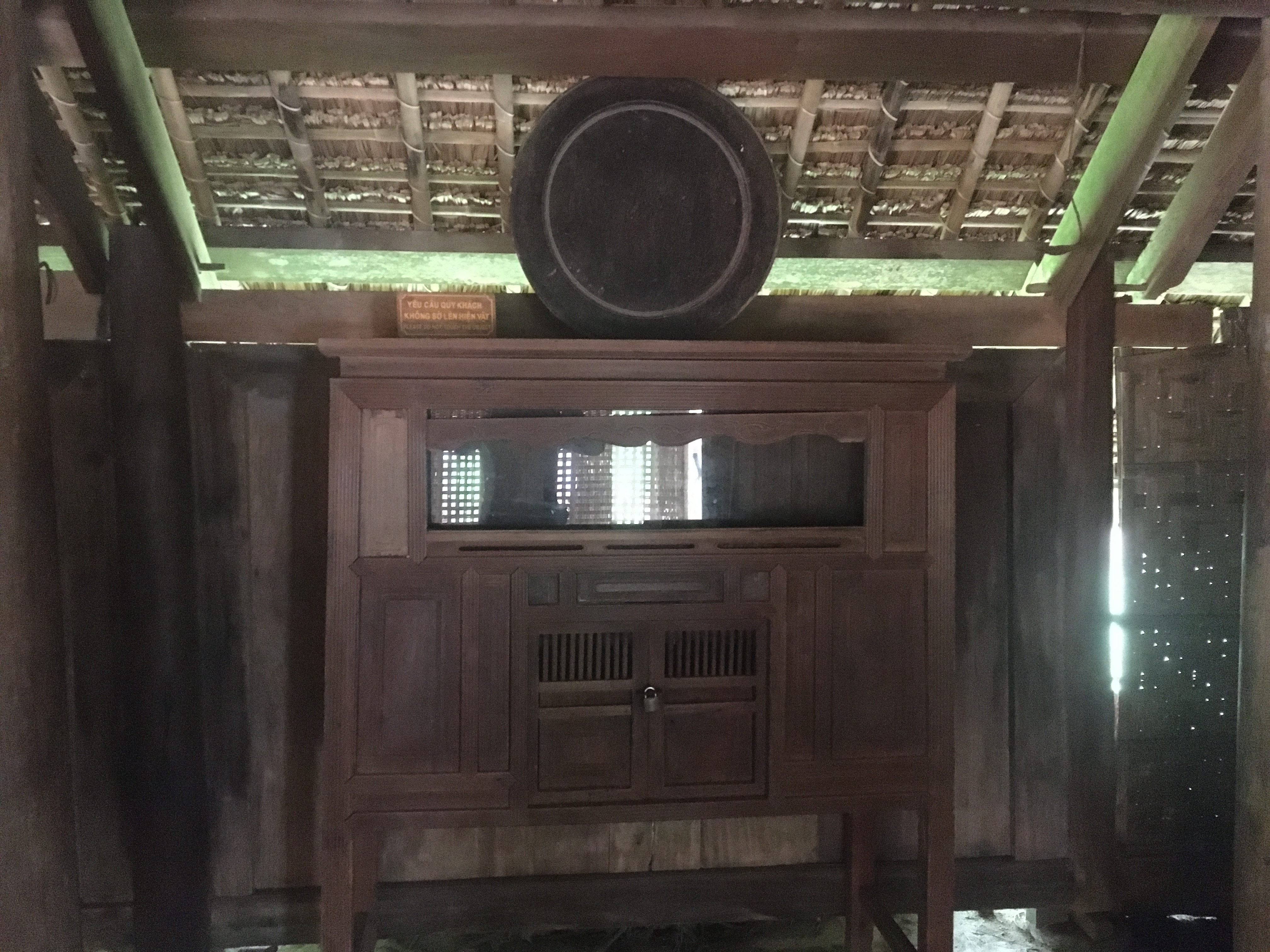 |
| Wooden tray for guests of Uncle Ho's family. Photo by Le Ha |
He still remembers clearly the surrounding scenery and the arrangement of the house. Uncle said: "In the past, the alley to my house followed this path, on one side there was a row of man hao tea, on the other side there was a row of hibiscus." In the garden, the cadres asked for permission to plant flowers, but Uncle wanted to plant crops: "Sweet potato flowers are still beautiful" to improve the people's lives, making everyone feel choked up. For many years, "Mr. Pho Bang's House" - the house where Uncle lived during his childhood - has become a gathering place for the Vietnamese people and friends from around the world. Sen Village has become the "Common Homeland" of everyone.
Every year, this place welcomes millions of visitors, including many heads of state and high-ranking delegations from many countries. People come here to express their gratitude and admiration for a great man, a noble moral example, a pure and simple life, imbued with the spirit of the nation, a patriotic personality.
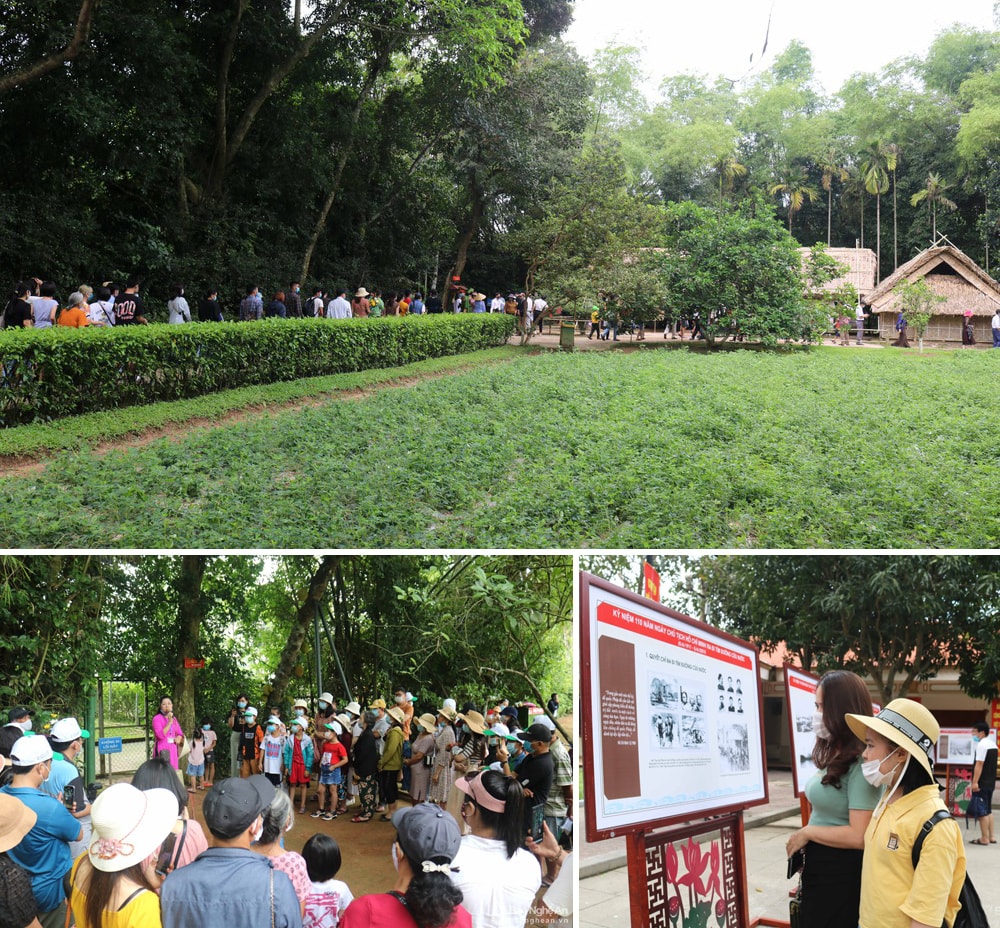 |
| Tourists visit Uncle Ho's hometown. Photo: Huy Thu |
Mr. Yamada, a Japanese guest, said: “In Japan, I only knew Ho Chi Minh as the President of Vietnam, a man admired by the world. Coming here, I realized that only this land could give birth to this great man. And it was this great man who made this land shine. I will take turns letting my colleagues visit this relic complex as I did today.” That’s right! From his homeland, his family and his simple thatched roof house contributed to the great personality of President Ho Chi Minh.
Until today, "The Vice-Chancellor's House" has been preserved and carefully maintained for 121 years. The thatched roof is re-thatched every year. The wood and thatch are treated for mold and mildew. The flower garden, the hibiscus hedge, and the row of tea trees right at the entrance are carefully tended and trimmed. Visitors feel like they have found the warmth of Uncle Ho's childhood. Choking with emotion, the late Lieutenant General Nguyen De wrote in the golden souvenir book: "Thank you, comrades of the Kim Lien Homeland Museum, for preserving these precious relics to educate generations to forever follow Uncle Ho's example." The letters, poems, confidences, and sharing of compatriots and visitors will be a source of great happiness and encouragement for generations of cadres who have worked and are working at the Kim Lien Relic Site - a place to preserve a priceless cultural heritage of the nation.
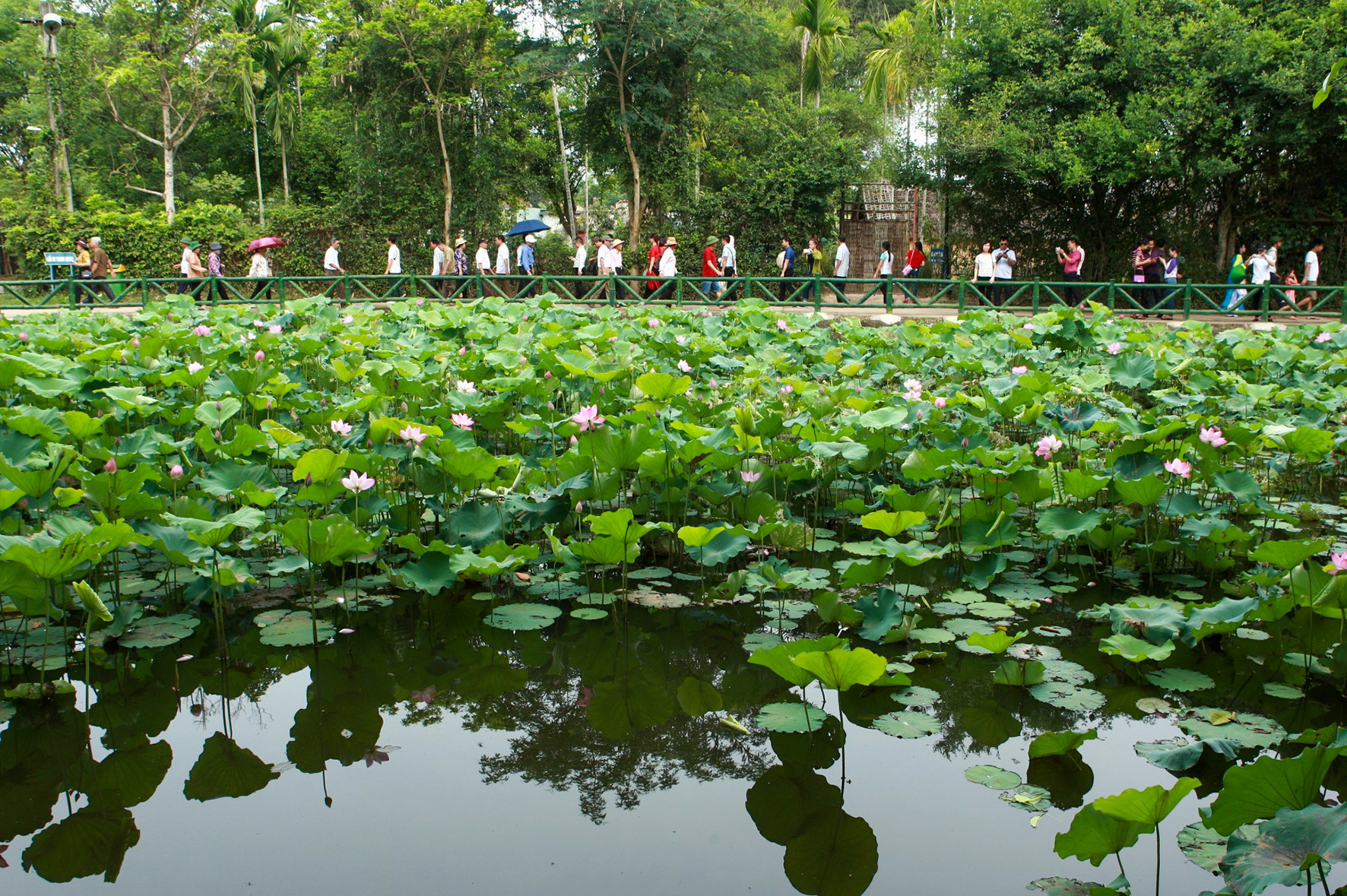 |
| Pilgrims walk amidst the lotus scent of Uncle Ho's hometown in May. Photo courtesy: Nguyen Book |
During the historic May days, the whole nation joyfully celebrated the 132nd anniversary of President Ho Chi Minh's birthday. Tourists and descendants returned to Kim Lien relic site, visited "The Deputy Doctor's House", witnessed the preserved relics that had gone through many years of time, filled with the love of the people and visitors to feel more clearly a great ideology, a patriotic personality, a noble moral quality that shone from the simple, frugal lifestyle of Uncle Ho's family. Entering the house where Uncle Ho lived during his childhood, we felt more deeply one thing: "Ho Chi Minh is like his homeland and the house he lived in. Close but noble, simple but great and sacred".
The simple thatched house, family and homeland contributed to nurturing the soul, spirit, mettle, and cultural style imbued with the homeland spirit of a great man of the 20th century, giving rise to a patriotic spirit and great ideology of the "National Liberation Hero"./.

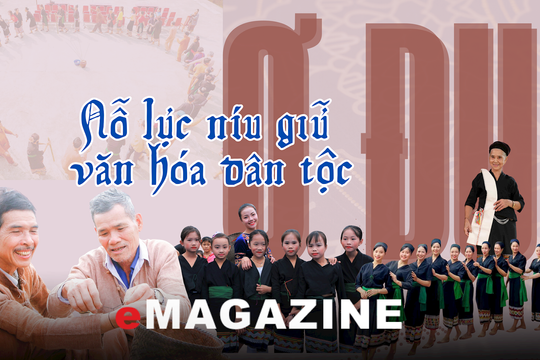
.jpg)
